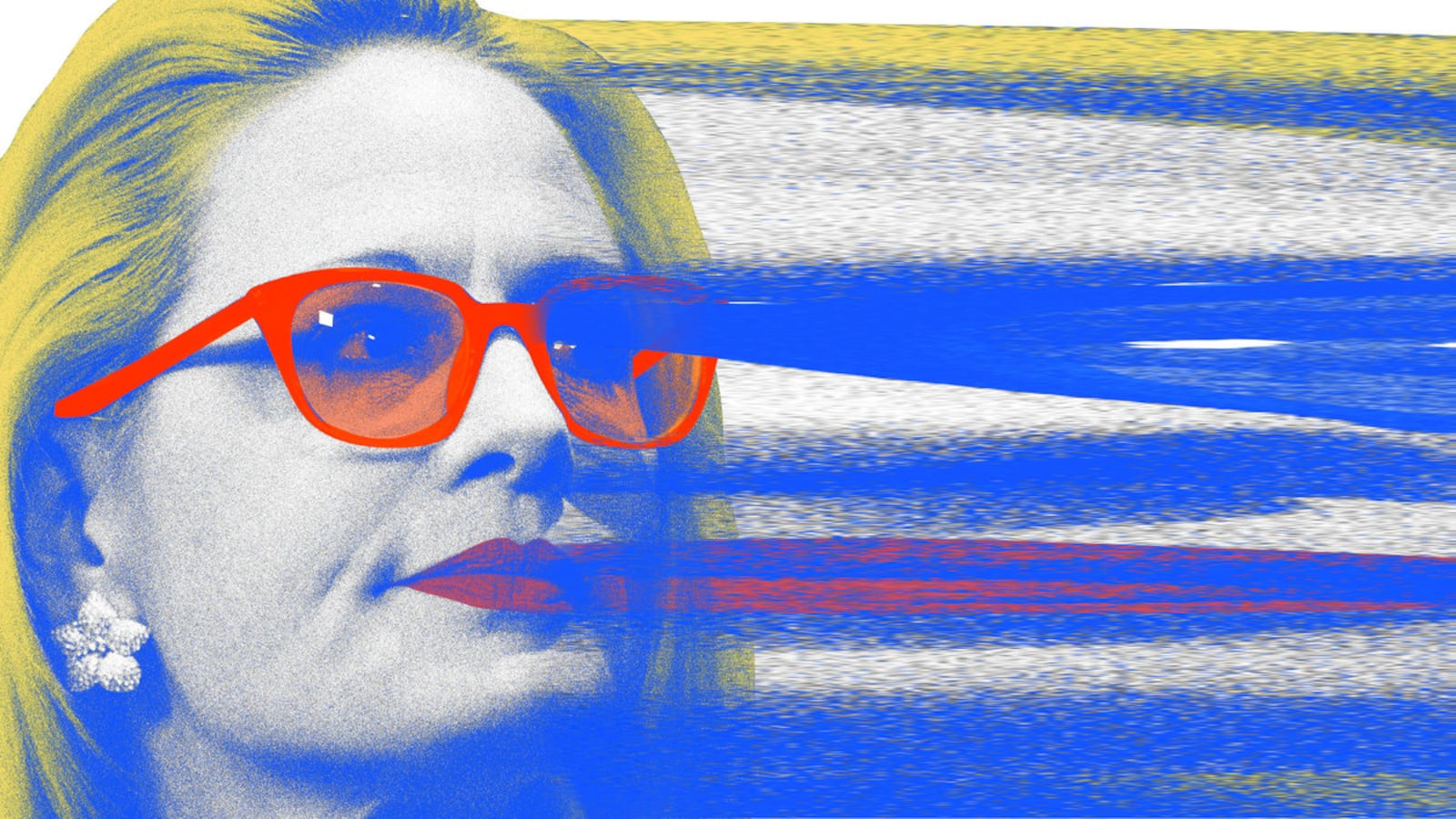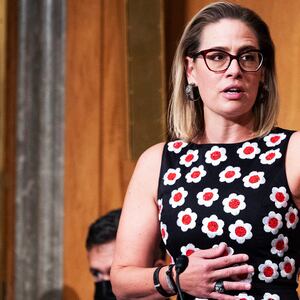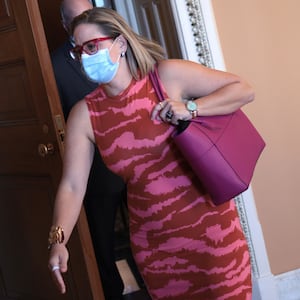When people ask Kyrsten Sinema if she wants to run for president someday, the Arizona senator usually has a stock answer: “I’m overqualified.”
That response, relayed to The Daily Beast by a former friend, is vintage Sinema. It’s quick and witty but also self-aggrandizing and self-deprecating all at the same time. The quip also sheds a rare bit of light on a political figure on center stage in Washington who is, all the while, paradoxically guarded and enigmatic.
For many people both inside and outside the Beltway—who are hanging on her every maneuver around President Joe Biden’s legislative agenda—Sinema is a mystery. And for people who once considered themselves her allies, friends, and confidants, the senator is now mostly a black box to them, too.
Chris Herstam is among them. A former Republican lawmaker in Arizona turned Democratic commentator, he appeared on local news panels with Sinema back when she served in the statehouse and grew impressed with the voluble, sharp, and unabashedly liberal lawmaker.
When Sinema decided to run for Congress in 2012, Herstam cut her a $500 check and would donate a total of nearly $3,500 to her subsequent campaigns over the next six years.
Sinema was a “fundraising machine,” Herstam told The Daily Beast, but took meticulous care of her network of supporters in Arizona. “She’d call and ask for money,” he said, “but you could pick her brain and listen to her views about issues.”
Things are different now. Herstam says he and Sinema do not talk anymore—in his telling, Sinema felt he had violated her confidence with some political analysis he had posted to Twitter.

Sen. Sinema speaks briefly to reporters as she boards an elevator following votes on Sept. 20, 2021 in Washington, DC.
Chip Somodevilla/Getty ImagesAmid that silence, Herstam has grown increasingly baffled by Sinema’s activity in office, particularly in the last few months, as she has emerged as one of the two most pivotal Democratic objectors to the multi-trillion dollar social and economic package the party is trying to push through Congress. These days, on Twitter and in his appearances on local TV and radio, Herstam forcefully criticizes the politician he once admired.
It is not unusual for allies to have a falling-out amid perceived slights and political differences. But, Herstam says, “when I talk to other individuals that consider themselves friends of hers, they told me they haven’t spoken to her in over a year, and when they’ve contacted her to inquire why she’s doing what she’s doing politically, they don’t get callbacks,” he said. “She’s clearly gone in a different direction.”
That claim was corroborated by five other sources. In total, more than a dozen people spoke to The Daily Beast about Sinema’s political orbit, some of whom requested anonymity because they were not authorized to candidly speak about the dynamics at play, or feared professional repercussions for doing so. A spokesperson for Sinema declined to comment after being sent a list of questions for this story.

Sen. Sinema attends a Senate Homeland Security and Governmental Affairs Committee meeting on Oct. 6, 2021 in Washington, DC.
Kevin Dietsch/Getty ImagesSinema retains a small kitchen cabinet of advisers outside of her Senate office and has developed good working ties with officials around the state—including with many Republicans. But the network of allies and supporters who fueled her rise over the last decade, sources said, has largely fallen apart.
The senator’s politics may help explain why. Many former supporters are not just perplexed by her political maneuvering but also her policy stands and are having a hard time imagining themselves backing her going forward. But there are personal reasons, too. Some believe Sinema has decided she simply no longer needs some people, including those who were once close or worked hard to get her where she is today.
“A lot of people who have considered her a friend, or confidant, or someone she’d go to for donor support or political support, she won’t talk to those people anymore,” said Matt Grodsky, a former communications director for the Democratic Party of Arizona.
“She had a big network of people who liked her—establishment Democrats, progressives—everyone marveled at her ability to win in Arizona,” said one Democratic strategist in the state. “A lot of her longtime friends and confidants are no longer there. No one knows, to be honest, where she’s at.”
Another Democratic source in Arizona said her allies in the party “don’t exist anymore.”
“She’s burned so many bridges with the allies she used to have,” this source added.
Now, however, Sinema may need all the support she can get. In an evenly split Senate, her willingness to brandish veto power over the Democratic agenda has made her persona non grata to liberals nationwide—and fodder for parody on Saturday Night Live.
Back home, progressive groups are blanketing Arizona with ad campaigns trashing the senator, or outright calling for her to be replaced with a different Democrat when she is up for re-election in 2024. Left-wing demonstrators have begun to follow her everywhere—even, recently, to a lecture hall bathroom—to barrage her with questions about her stances, which she rarely answers. Fresh polling has shown her standing among Arizona Democrats cratering over the last nine months.
With seemingly all of Washington anxious to learn anything at all about where she stands on the centerpiece of her party’s agenda, however, some former Sinema associates claim to have no idea who is guiding her now. Even those who strongly disagree with what she’s doing still said they wondered about how she is handling this moment.
“She’s a talented, special person, but has always been in sort of survival mode,” said someone who has worked with Sinema. “She’s really put herself in a tough position.”
That sentiment is shared by others who were once close to her. The former friend of Sinema’s told The Daily Beast that several of Sinema’s close personal friendships have ended abruptly and, to them, under confusing circumstances.
Still, the former friend, who was granted anonymity to detail their experience, worried about how the senator was faring with the immense amount of scrutiny she’s under. “I don’t harbor any ill will toward her, but I do feel bad for her,” this person said. “She’s put herself in a tight little spot, and I’m not sure how she’s going to get out of it.”
Typically, politicians are supported by networks of former staffers who have moved on but still remain loyal to their former boss. That is less the case with Sinema who, according to a former aide, was a “tough boss.”
“Unfortunately, many of the problems with the working environment in her office are fairly common on Capitol Hill,” added this former aide, who noted that some staffers found success and happiness in the office if they got along with the senator, but others “could not get out fast enough.”
The dynamic seems to have harmed Sinema’s broader ability to cultivate a strong network. “Former staffers stay in touch, but it’s not a traditional Capitol Hill alumni network built around loyalty to the boss,” said the former aide.
An Arizona Democrat concurred, saying the senator “has not built this network of people who are ‘Sinema people.’”
Increasingly, former denizens of Sinema-world believe she is convinced that she alone can maneuver herself through any situation, including this one, the most high-stakes of her career. One prominent Arizona Democrat mused that they did not know who her advisers were but that Sinema would probably find them unhelpful—no matter what.
“She is her own political strategist,” the Arizona-based strategist said. “It’s her.”
Others who know Sinema well agree that’s the case—and believe that arrangement will work out just fine for her.
Marcus Dell’Artino, an Arizona political strategist who formerly worked for the late GOP Sen. John McCain, has half-joked that Sinema is the biggest threat to the Republican Party in Arizona. He called her a “rational, thoughtful political leader” who is acting the way her purple-state constituents want—even if her former allies were upset about it.

Sen. Sinema speaks to the media after a procedural vote for the infrastructure framework on July 28, 2021 in Washington, DC.
Alex Wong/Getty Images“Is she her own boss? Yeah, because she does her homework, and has a long-term vision,” Dell’Artino said. “She’s seen the inner workings of the state Democratic Party, and she sees, for her, she probably has a better way or a smarter strategy—which, clearly, has worked.”
It was not always like this, as several sources said, but Herstam recalls past conversations with Sinema that seemed to predict her current estrangement with Democratic allies. A few years ago, he became convinced that Sinema no longer felt that the Democratic Party, either nationally or in Arizona, could really help her anymore.
“She didn’t have much use for them, and didn't think they were going to be that helpful in a campaign. And she felt here in Arizona that most Democrats would lose and she would do her own thing,” he said. “And that has just blossomed.”
In 2018, Sinema flipped her Senate seat—held by the GOP for decades—after an expensive and brutal campaign in which she often avoided mentioning that she was a Democrat.
Sinema’s track record of electoral success in Arizona, said the former aide to the senator, has come in spite of scores of people privately urging her toward one strategy or another. “You get the sense that there aren’t many people whose opinions she trusts,” the former aide said. “Arizona voters and the local press have pretty consistently rewarded her for ignoring those voices and doing things her way.”
In a rare interview earlier this year, Sinema made her philosophy clear, when asked by POLITICO to comment on her critics.
“It’s not effective to pressure me on anything,” she said. “Because I am a thoughtful person who takes a lot of time, deliberatively, to make decisions, once I’ve made a decision, I feel very comfortable with it. And it doesn’t matter what other people think.”
Perhaps that explains why Sinema has been so reluctant to speak directly with some interest groups about the multi trillion-dollar social welfare package before Congress.
One Phoenix-based group, the Children’s Action Alliance—which is run by David Lujan, a Sinema ally from the statehouse—has been unable to get a meeting with the senator, according to Calli Jones, the group’s federal engagement director. And while she said they’d had helpful conversations with the senator’s staff, they’ve also asked for a direct conversation with Sinema to no avail.
The senator’s inaccessibility to advocates like these has many former associates scratching their heads not only at the political rationale behind it—but wondering what responsibilities of the office appeal to Sinema at all.
“Part of the job is managing a coalition,” said someone who previously worked with Sinema. “What about the people who not only voted for you, but sweated their balls off in 100 degree heat knocking doors for you? You can’t talk to them? It’s profoundly disrespectful.”
Some Democrats also feel that Sinema increasingly favors corporate interests these days, with some pointing to her reluctance to back a measure to lower prescription drugs through Medicare.
One D.C. lobbyist told The Daily Beast that on K Street, Sinema is often thought of as something of an enigma. But the lobbyist added a qualifier: “If you’re a Republican downtown,” they said, “you think she’s the greatest person ever.”
This dynamic has some in Arizona wondering what it all means for Sinema’s political future, a few years away from a potentially tough 2024 re-election fight.
“My hunch is she has given up on her previous network because she doesn't think she needs it,” Herstam said. “I think she envisions herself as an independent that raises an enormous amount of money, puts most of that money into outstanding political television commercials, and she can get elected on her own.”
At only 45 years old, Sinema could be a major player in politics for decades. Her wry answer to questions about her future ambitions notably does not foreclose the possibility of her running for higher office someday.
Admirers like Dell’Artino believe it is not something she really thinks about. “Right now, she enjoys this job, and is trying to do what she thinks is the right thing for her constituents,” he said. “Anybody putting more thought into it than that probably doesn’t know Kyrsten very well.”
But Sinema’s onetime staunch supporters in Arizona are left to wonder how the network that helped get her where she is will factor into her future.
“It’ll be interesting to see how she’s going to fix this,” said Grodsky, the former Arizona Democratic Party spokesman. “If she even wants to do that.”






